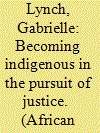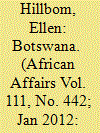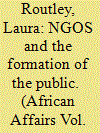|
|
|
Sort Order |
|
|
|
Items / Page
|
|
|
|
|
|
|
| Srl | Item |
| 1 |
ID:
110890


|
|
|
|
|
| Publication |
2012.
|
| Summary/Abstract |
The February 2010 ruling of the African Commission on Human and Peoples' Rights on the Kenyan government's violation of the Endorois people's rights is the Commission's most substantive and radical decision to date, with important implications for international jurisprudence, national politics, and local strategies - as well as potential socio-economic realities and inter-communal relations. The ruling combined a liberal interpretation of the African Charter with far-reaching recommendations and the request for a government progress report. It was the first time that the Commission had decided on and extended individual and peoples' rights to indigenous people, and is the first time in the world that a specific right to development has been adjudicated upon. By accepting the Endorois as an indigenous community the decision completes a process of ethnic invention that began in the 1990s, and has seen Endorois assert ethnic difference from their Kalenjin neighbours as a strategy of legal argument. The outcome is a victory for Endorois leaders and may help other communities tackle state injustice. However, the broad implications for social justice and inter-communal relations are contentious given the decision's reinforcement of an inherently exclusive sense of ethnic territoriality and neglect of gross inequalities in wealth and power. From this perspective, the decision reflects a modern obsession with the 'politics of recognition' to the neglect of a 'politics of redistribution'.
|
|
|
|
|
|
|
|
|
|
|
|
|
|
|
|
| 2 |
ID:
110892


|
|
|
|
|
| Publication |
2012.
|
| Summary/Abstract |
Due to a combination of exceptional economic growth and social development, Botswana has been hailed as an African developmental state. This article rejects the developmental state theory and instead attempts to build an alternative theoretical model. It argues that from the 1930s until the present, Botswana has experienced a state structure characterized by natural resource dependency, lack of economic diversification, a dual society, selective social development and a close connection between the economic and political elite. In the tentative theoretical model presented and discussed here, these are all defining traits of a gate-keeping state. It is hence argued that while Botswana's socio-economic development since independence should in no way be underestimated, it is better understood as the efforts of a development-oriented gate-keeping state rather than a developmental state.
|
|
|
|
|
|
|
|
|
|
|
|
|
|
|
|
| 3 |
ID:
110889


|
|
|
|
|
| Publication |
2012.
|
| Summary/Abstract |
While a doctrine of liberal interventionism seems to be gaining acceptance, it remains constrained by the resilience of state sovereignty and by the resistance of internal elites to externally driven prescriptions. This article looks at Côte d'Ivoire's tortuous peace process and at the recent post-electoral crisis, exploring how former Ivoirian President Laurent Gbagbo developed strategies for neutralizing the threat that international peacemaking and peacekeeping intervention posed to his rule. It is argued that a particular ideological discourse played a crucial role in Gbagbo's struggle against 'global governance'. Such a discourse combined the legalistic exaltation of state sovereignty, a fierce anti-colonial nationalism, and religious overtones in portraying the Ivoirian crisis as a 'war of second independence' against a wide range of international enemies. While nationalist rhetoric had been toned down after the conclusion of the Ouagadougou Political Agreement in 2007, the confrontation between Gbagbo and the international community reignited during the 2010-11 post-electoral crisis. A series of new developments - in particular the UN's certification mandate - rendered Gbagbo's political tactics and the recourse to nationalism ineffective and contributed to his fall.
|
|
|
|
|
|
|
|
|
|
|
|
|
|
|
|
| 4 |
ID:
110893


|
|
|
|
|
| Publication |
2012.
|
| Summary/Abstract |
Sierra Leoneans have long seen their governance institutions as unresponsive and inefficient. Following the civil war, the government adopted a plan of fiscal, administrative, and political decentralization to mitigate widespread corruption, enhance accountability, and reverse the over-concentration of central authority in Freetown. The key institutions of decentralization, the chieftaincy system and local councils, play important but uneven decision-making, management, and implementation roles, making the process prone to elite capture. This article analyses the peacebuilding implications resulting from variation in strategies to counter elite capture in decentralization. It argues that the UN's variation of this approach, which focuses on relations between elites, has yielded few positive results. A second variation, employed mainly by international and national non-governmental organizations (NGOs), focuses on rebalancing asymmetries between elites and non-elites, and has been more effective in sensitizing non-elites to demand good governance and accountability. The challenges of redressing power imbalances between chiefdom actors and non-elites remain, and in addition to continued, robust oversight of local councils, the chieftaincy system requires deeper reforms to guard against further marginalization of non-elites and to achieve liberal peacebuilding goals.
|
|
|
|
|
|
|
|
|
|
|
|
|
|
|
|
| 5 |
ID:
110894


|
|
|
|
|
| Publication |
2012.
|
| Summary/Abstract |
This article examines the formation of 'the public' or 'the people' as negotiated by a small number of national NGOs in eastern Nigeria. The ways in which these NGOs conceive of 'the people' or 'the public' and the actions they undertake are often at odds with conceptions of 'the public interest' implicit in much development policy. At the same time, their actions do not conform to a moral economy governed by obligations to primordial groups. Instead, this article argues that the NGOs are seeking a particular kind of accountability from the state, and concludes that the forms of accountability pursued by NGO workers provide important insights into how the Nigerian state is perceived and ultimately produced.
|
|
|
|
|
|
|
|
|
|
|
|
|
|
|
|
| 6 |
ID:
110891


|
|
|
|
|
| Publication |
2012.
|
| Summary/Abstract |
The prevention of inter-communal conflict in cities where multiple religious and secular norms and processes affect the delivery of security and justice is a major challenge for governments and residents. Most analyses of conflict prevention focus on the part played by traditional authorities or civil society associations, downplaying the role of public police forces.Yet fieldwork in Kano, northern Nigeria, suggests that locally appropriate forms of conventional policing can be highly effective in lowering tension. While the need to negotiate with Kano's semi-state and informal policing actors has not reconfigured the Nigerian police's authority practices, Kano's relative stability owes much to the political and technical skills with which senior police officers manage the city's competitive environment.
|
|
|
|
|
|
|
|
|
|
|
|
|
|
|
|
|
|
|
|
|